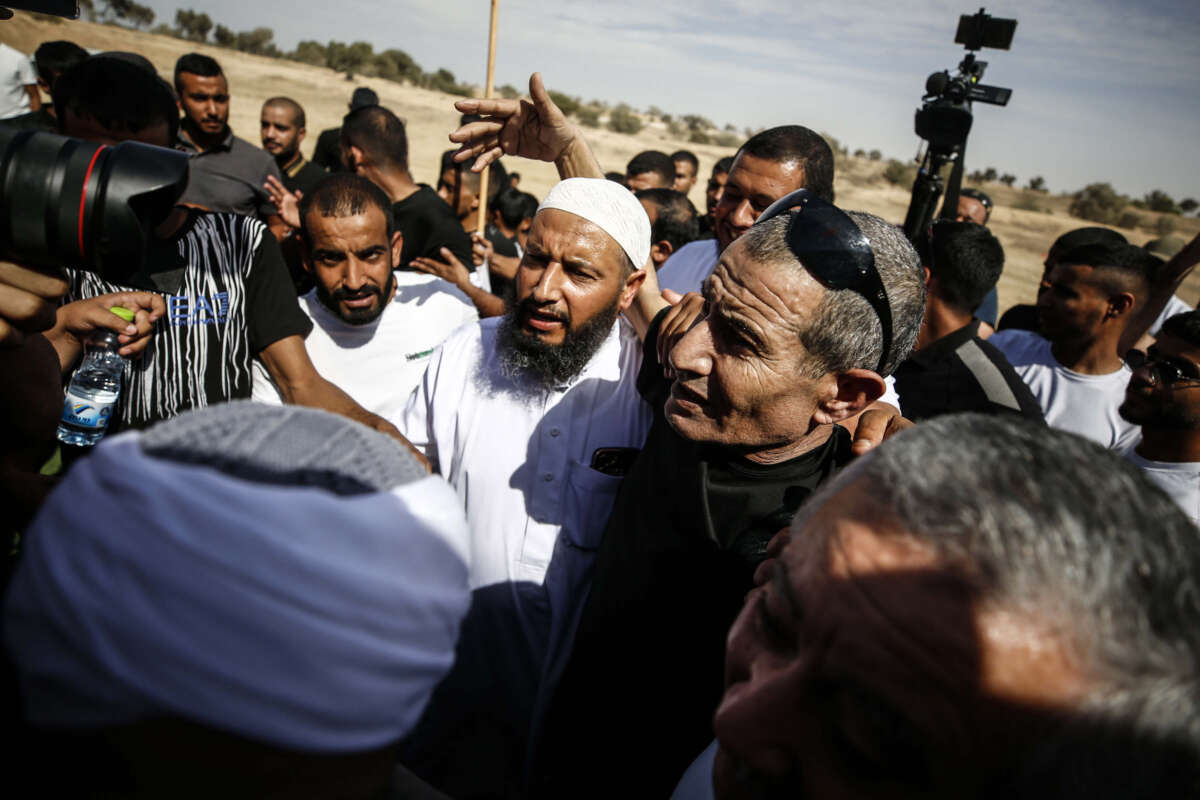Israeli officials celebrated the freeing of a Bedouin Arab hostage, Kaid Farhan al-Kadi, from captivity in Gaza this week — but have glossed over the fact that Al-Kadi is returning home to a village that has been marked for major demolitions by the Israeli government.
The 52-year-old Israeli citizen was freed this week from a tunnel in Gaza, and his return was feted by his village. He is in stable condition medically, the Israeli military said. Israel has claimed responsibility for freeing him, though Israeli media reports have suggested that he personally escaped from captivity before being freed by Israeli forces. Hamas has said that they released him.
But there is a bittersweet atmosphere across al-Kadi’s home village of Khirbet Karkur, The Associated Press reports, as roughly 70 percent of the residents of the village have been told that Israel has marked their homes for demolition, meaning that many will be effectively rendered homeless like countless others who have been displaced by Israel’s decades of ethnic cleansing.
The Israeli military has said that it won’t demolish al-Kadi’s family’s home “in light of the situation” — suggesting that Israel would have made him and his family homeless if he hadn’t been captured by Hamas forces and freed.
The residents of Khirbet Karkur were forced into the village by Israel in the 1950s amid the Nakba, in which Zionist forces violently displaced hundreds of thousands of Palestinians and Bedouins from their homes.
Israel claims they wish to demolish the village because it was built “illegally” and without permits — but Bedouins have said that Israel makes it nearly impossible for their towns to get the proper permits and, therefore, their villages are unrecognized by Israel as official towns.
Advocates have said that Israel weaponizes that status to block these villages from receiving basic services like water, electricity, sanitation and roads. Khirbet Karkur is no different, located next to a large garbage dump and lacking crucial infrastructure.
Israel has accelerated the destruction of Bedouin infrastructure in recent years, and according to the Negev Coexistence Forum for Civil Equality, Israel demolished over 2,000 Bedouin structures in the first half of 2024.
In May, Israel destroyed 47 Bedouin homes in a community in the Negev region in one day. Thousands more Bedouins are at risk of being forcibly displaced by Israel. Meanwhile, Bedouins have increasingly been targeted by settler pogroms since October and have had their homes and land stolen by Israel for decades, subject to much of the same dispossession that Israel has inflicted upon Palestinians.
Comparing the demolition of supposedly illegal Bedouin homes to Israel’s encouragement of the building of Israeli settlements that are illegal according to international law highlights a stark double standard. As Israel has razed homes of Bedouins in recent months, it has also accelerated violent settlement expansion over Palestinian land in the occupied West Bank.
Meanwhile, advocates have said that the contrast between Israel’s touting of the “complex operation” it undertook to free al-Kadi and the circumstances surrounding his village highlight how Israel is not concerned with the safety of the Israeli hostages, but is rather exploiting them to continue its genocidal assault of Gaza.
Angry, shocked, overwhelmed? Take action: Support independent media.
We’ve borne witness to a chaotic first few months in Trump’s presidency.
Over the last months, each executive order has delivered shock and bewilderment — a core part of a strategy to make the right-wing turn feel inevitable and overwhelming. But, as organizer Sandra Avalos implored us to remember in Truthout last November, “Together, we are more powerful than Trump.”
Indeed, the Trump administration is pushing through executive orders, but — as we’ve reported at Truthout — many are in legal limbo and face court challenges from unions and civil rights groups. Efforts to quash anti-racist teaching and DEI programs are stalled by education faculty, staff, and students refusing to comply. And communities across the country are coming together to raise the alarm on ICE raids, inform neighbors of their civil rights, and protect each other in moving shows of solidarity.
It will be a long fight ahead. And as nonprofit movement media, Truthout plans to be there documenting and uplifting resistance.
As we undertake this life-sustaining work, we appeal for your support. Please, if you find value in what we do, join our community of sustainers by making a monthly or one-time gift.
